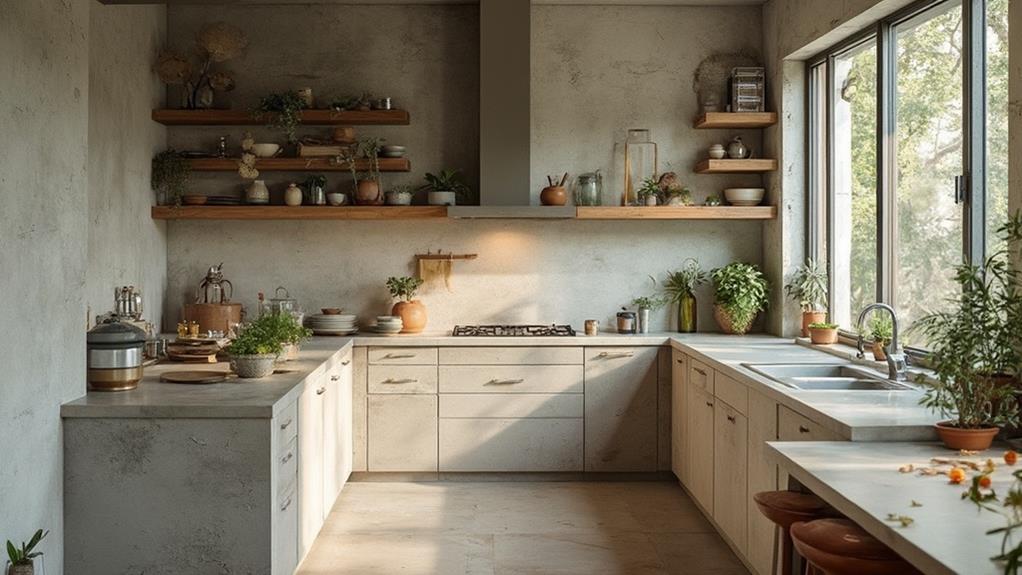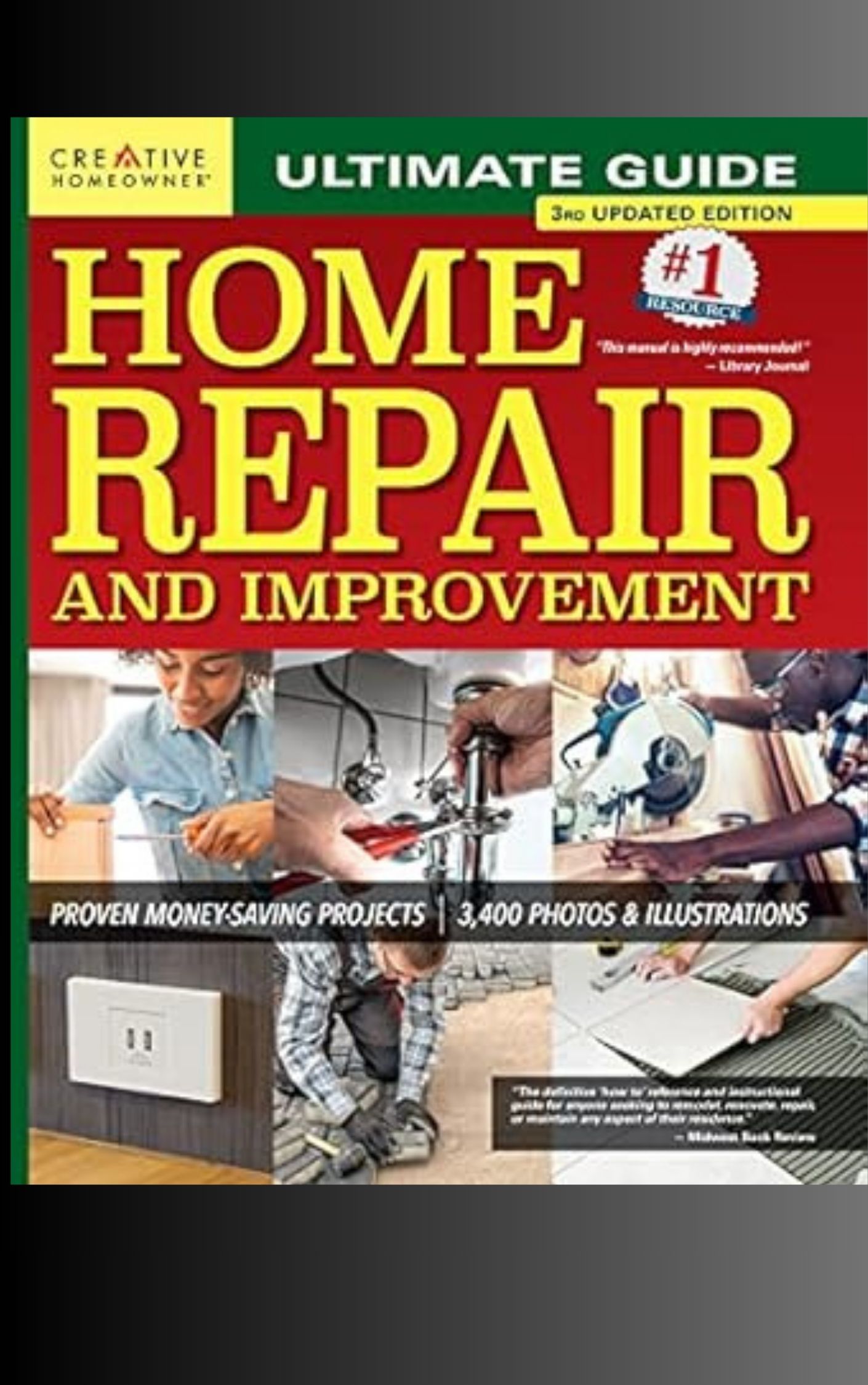Kitchen countertop alternatives offer stylish and budget-friendly options for homeowners seeking unique surfaces. Butcher block countertops provide warmth and functionality, while laminate surfaces offer versatility and easy maintenance. Concrete countertops allow for customization and durability, and recycled glass options present an eco-friendly choice. Quartz alternatives combine natural and engineered materials for a low-maintenance surface. Stainless steel workspaces deliver a sleek, modern look, and solid surface countertops offer seamless designs. Tile countertops enable creative patterns and accent colors. These alternatives cater to various tastes and budgets, providing innovative solutions for kitchen renovations. Exploring these options can reveal surprising possibilities for transforming your kitchen space.
Butcher Block Countertops
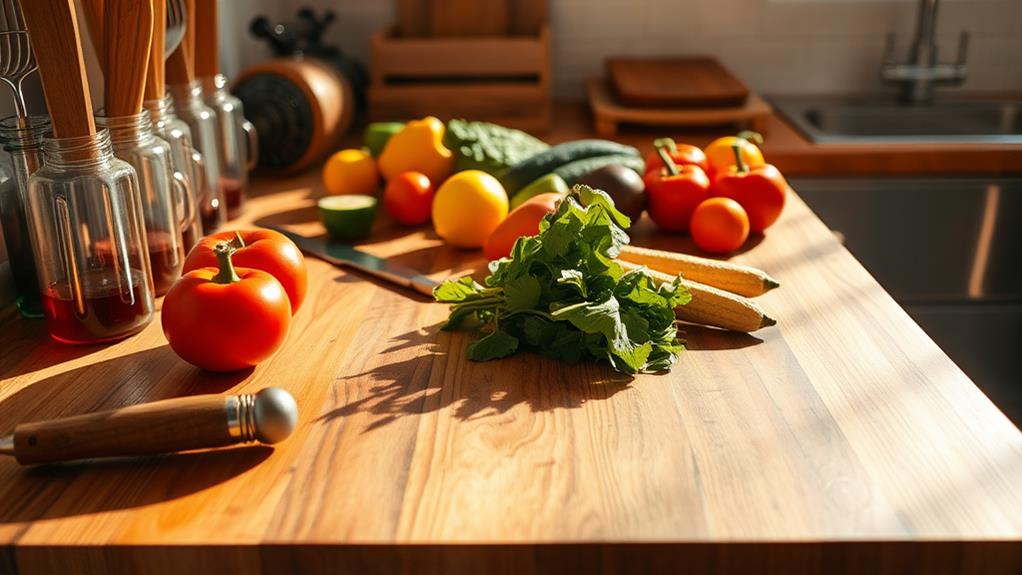
Crafted from sturdy wood strips, butcher block countertops offer a warm and inviting alternative to traditional kitchen surfaces. These countertops are typically made from hardwoods like maple, oak, or walnut, providing durability and a distinctive aesthetic. The natural wood grain adds character to any kitchen, complementing both modern and rustic design styles.
Butcher block countertops are prized for their functionality, serving as an ideal surface for food preparation and chopping. They are gentle on knives, reducing blade dulling compared to harder surfaces. Regular oiling maintains their appearance and helps prevent water damage and staining.
One of the main advantages of butcher block is its affordability compared to stone or engineered materials. It's also relatively easy to install, making it suitable for DIY projects. However, butcher block requires more maintenance than other countertop options. It's susceptible to scratches, dents, and water damage if not properly cared for.
Despite these considerations, many homeowners find the warmth and versatility of butcher block countertops outweigh the maintenance requirements. With proper care, these countertops can last for decades, developing a rich patina that adds to their charm and character.
Laminate Surfaces
Laminate countertops offer a budget-friendly and versatile option for kitchen surfaces. Made from layers of plastic bonded to particleboard or kraft paper, laminate is available in a wide array of colors, patterns, and textures. Modern manufacturing techniques have greatly improved the quality and appearance of laminate, allowing it to mimic more expensive materials like granite, marble, or wood.
One of the main advantages of laminate is its low cost compared to natural stone or solid surface options. It is also relatively easy to install and maintain, requiring minimal upkeep beyond regular cleaning. Laminate is resistant to stains and moisture, making it a practical choice for busy kitchens.
However, laminate does have some limitations. It can be scratched or chipped more easily than harder surfaces, and it is not heat-resistant, requiring the use of trivets for hot pots and pans. While laminate can last for many years with proper care, it may need to be replaced sooner than more durable materials. Despite these drawbacks, laminate remains a popular choice for homeowners seeking an affordable and attractive countertop solution.
Concrete Countertops
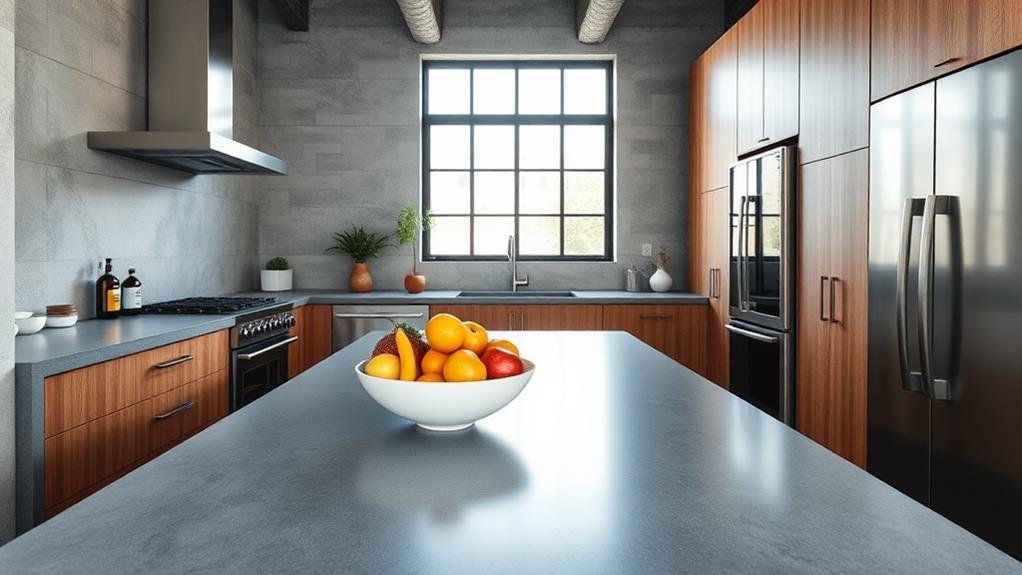
Moving from synthetic to more industrial materials, concrete countertops have gained popularity in recent years as a unique and customizable option for kitchen surfaces. These countertops offer a distinctive, modern aesthetic that can be tailored to suit various design preferences. Concrete can be molded into any shape, allowing for seamless integration of sinks and custom edges. It can also be tinted with pigments to achieve a wide range of colors, from subtle earth tones to bold hues.
One of the primary advantages of concrete countertops is their durability. When properly sealed, they resist scratches, heat, and stains. However, they do require regular maintenance to prevent cracking and ensure longevity. Installation can be complex, often requiring professional expertise to achieve the desired finish and structural integrity. While concrete countertops can be more affordable than some high-end materials like natural stone, the cost can vary significantly depending on customization and installation complexity.
DIY enthusiasts may find concrete an appealing option for creating unique, personalized countertops, though achieving a professional-quality result requires skill and careful planning.
Recycled Glass Options
Eco-conscious homeowners are increasingly turning to recycled glass countertops as an environmentally friendly alternative to traditional materials. These countertops are made from post-consumer recycled glass, which is crushed and combined with a binder to create a durable and visually striking surface.
Recycled glass countertops offer a wide range of aesthetic options, from subtle, monochromatic designs to bold, colorful patterns. The glass fragments can be customized in size and color, allowing for unique and personalized looks. These countertops are non-porous, making them resistant to stains and bacteria growth, and easy to clean and maintain.
In terms of durability, recycled glass countertops are comparable to natural stone, with high resistance to scratches, heat, and impacts. They are also UV-resistant, making them suitable for both indoor and outdoor use. While the initial cost may be higher than some traditional options, their longevity and low maintenance requirements can offset this investment over time.
Installation of recycled glass countertops typically requires professional expertise due to their weight and the need for proper sealing. However, once installed, they provide a sustainable and visually appealing option for environmentally conscious homeowners.
Quartz Alternatives
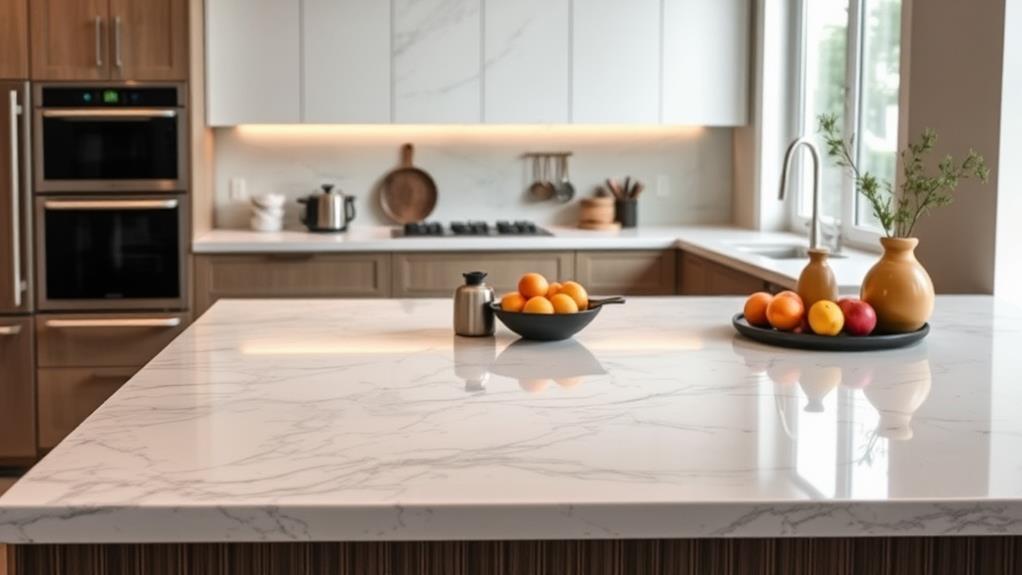
While recycled glass offers an eco-friendly option, quartz alternatives have gained popularity for their durability and versatility. These engineered stone countertops combine natural quartz crystals with resins and pigments, resulting in a non-porous surface that resists stains, scratches, and bacteria growth. Quartz alternatives come in a wide range of colors and patterns, mimicking natural stone or offering unique designs.
One popular quartz alternative is Silestone, known for its antimicrobial properties and extensive color options. Caesarstone is another well-regarded brand, offering a variety of finishes from polished to textured. For those seeking a more sustainable option, Vetrazzo combines recycled glass with quartz for a unique aesthetic.
Quartz alternatives are generally more affordable than natural stone countertops and require less maintenance. They don't need sealing and can be cleaned with mild soap and water. However, they may not be as heat-resistant as some natural stones, so using trivets is recommended. When considering quartz alternatives, homeowners should compare brands, warranties, and installation costs to find the best option for their kitchen renovation project.
Stainless Steel Workspaces
Stainless steel workspaces offer a sleek, modern aesthetic while providing exceptional durability and hygiene for kitchen countertops. These surfaces are resistant to heat, stains, and bacteria, making them ideal for busy kitchens and food preparation areas. The non-porous nature of stainless steel prevents the absorption of liquids and odors, ensuring a sanitary cooking environment.
One of the main advantages of stainless steel countertops is their seamless integration with other kitchen appliances, creating a cohesive look. They are also customizable, allowing for integrated sinks and backsplashes. While the initial cost may be higher than some alternatives, the longevity and low maintenance requirements of stainless steel make it a cost-effective option in the long run.
However, stainless steel can show fingerprints and scratches more easily than other materials. Regular cleaning and occasional polishing are necessary to maintain its pristine appearance. Additionally, the industrial look may not suit all kitchen styles, particularly traditional or rustic designs. For those seeking a professional-grade kitchen or a contemporary aesthetic, stainless steel workspaces provide a durable and visually striking solution for countertops.
Solid Surface Materials
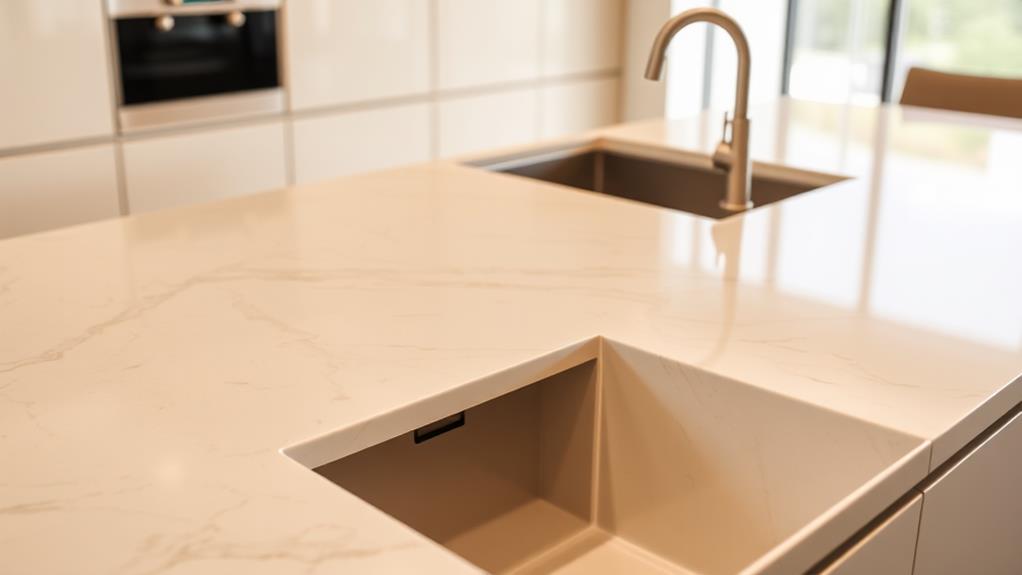
Selecting solid surface materials for kitchen countertops offers a versatile and durable alternative to traditional options. These non-porous, man-made materials are composed of acrylic, polyester resins, and natural minerals, creating a seamless and hygienic surface that resists stains, scratches, and bacteria growth.
Solid surface countertops come in a wide array of colors, patterns, and finishes, allowing homeowners to achieve a custom look that complements their kitchen design. Unlike natural stone, these materials can be easily repaired if damaged, often by simply buffing out minor scratches or seamlessly patching more significant issues.
Installation of solid surface countertops is relatively straightforward, with no need for sealing or special maintenance. They are heat-resistant, though it's advisable to use trivets for extremely hot items. Cleaning is effortless, requiring only soap and water for daily maintenance.
While solid surface materials may not have the same luxurious appeal as natural stone, they offer excellent value for money. Their durability, low maintenance requirements, and ability to mimic the appearance of more expensive materials make them an attractive option for budget-conscious homeowners seeking a stylish and practical kitchen countertop solution.
Tile Countertop Designs
For homeowners seeking a customizable and cost-effective countertop solution, tile designs offer a wide range of possibilities. Tiles come in various materials, including ceramic, porcelain, natural stone, and glass, allowing for diverse aesthetics and price points. This versatility enables homeowners to create unique patterns, incorporate accent colors, or mimic the look of more expensive materials.
Ceramic and porcelain tiles are popular choices due to their durability, affordability, and ease of maintenance. Natural stone tiles, such as granite or marble, provide a luxurious appearance but require more upkeep. Glass tiles can add a modern, sleek touch to contemporary kitchens.
When installing tile countertops, it's crucial to use a sturdy substrate and high-quality grout to ensure longevity. Epoxy grout is recommended for its stain and water resistance. While tile countertops offer numerous design options, they do have some drawbacks. The grout lines can collect dirt and bacteria if not properly sealed and maintained. Additionally, the uneven surface may not be ideal for tasks like rolling out dough. However, for those willing to invest in regular maintenance, tile countertops remain an attractive and budget-friendly option for kitchen renovations.
Frequently Asked Questions
How Do I Maintain and Clean Different Types of Kitchen Countertops?
Maintaining and cleaning kitchen countertops depends on the material. Generally, use mild soap and warm water for daily cleaning. Avoid abrasive cleaners and seal porous surfaces regularly. For specific materials like granite or quartz, follow manufacturer-recommended care instructions.
What Are the Most Heat-Resistant Countertop Materials for Kitchen Use?
The most heat-resistant countertop materials for kitchen use include granite, quartz, soapstone, and concrete. These materials can withstand high temperatures without damage. Stainless steel and ceramic tile also offer excellent heat resistance for cooking-intensive environments.
Can I Install Kitchen Countertops as a DIY Project?
Installing kitchen countertops as a DIY project is possible, but it depends on the material and your skill level. Some options, like laminate or tile, are more DIY-friendly. However, complex materials like granite or quartz may require professional installation.
Which Countertop Materials Are Best for Outdoor Kitchen Spaces?
While many materials claim outdoor durability, research shows that not all perform equally. For outdoor kitchen spaces, the best countertop materials are:
- Granite
- Concrete
- Stainless steel
- Soapstone
- Tile
These options offer superior weather resistance and longevity.
How Do Different Countertop Materials Affect Home Resale Value?
Different countertop materials can significantly impact home resale value. High-end options like granite and quartz typically offer the best return on investment, while mid-range materials such as solid surface and butcher block provide moderate value increases.
Conclusion
In conclusion, the diverse array of kitchen countertop alternatives offers homeowners a wealth of stylish and budget-friendly options. Like a painter's palette, these materials provide endless possibilities for creativity and personalization in kitchen design. From the warmth of butcher block to the industrial chic of concrete, each alternative brings unique characteristics to the space. By carefully considering factors such as durability, maintenance, and aesthetic appeal, homeowners can select a countertop solution that perfectly balances form and function.
